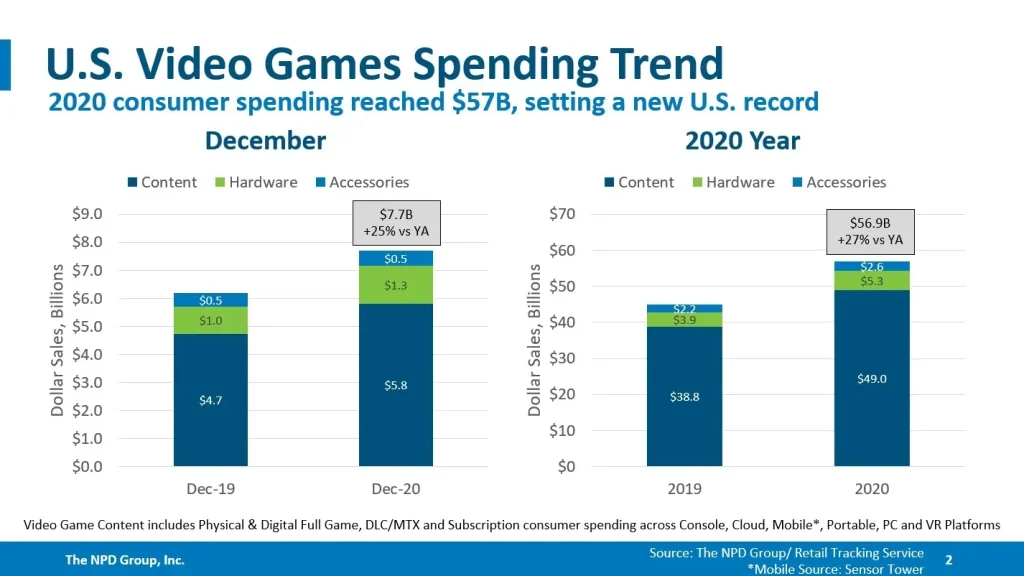Video game spending has become a pressing topic in the current economic landscape, particularly as reports indicate a significant decline in video game sales among young consumers. This alarming trend raises questions about the sustainability of the gaming industry, which has historically thrived even during economic downturns. With rising concerns about gaming prices and the perception of value, many young patrons are scaling back their expenditures, creating a challenging environment for developers and publishers. The gaming industry recession highlights not just the numbers, but the emotional disconnect consumers feel regarding the worth of their gaming purchases. As budgets tighten, particularly within the 18-24 demographic, the ramifications for the gaming sector may be profound and reverberate well into the future.
In recent discussions surrounding the gaming market, the term ‘gaming expenditure analysis’ has surfaced frequently, indicating a reevaluation of how funds are allocated towards video games. Emerging patterns show that the once-untouchable market for video games is now facing a formidable shift in consumer behavior, especially among younger age groups. Factors such as steep video game prices and criticisms of perceived value have led many individuals to reconsider their entertainment spending. What was once a reliable entertainment choice during economically tough times is now subject to scrutiny, often viewed as an unnecessary luxury. As the landscape of young consumers gaming continues to evolve, understanding their changing priorities will be essential for industry stakeholders.
The Decline in Video Game Spending Among Young Consumers
Recent market data reveals a stark trend: young Americans are significantly reducing their video game expenditures. According to reports, the average weekly spend on video games by individuals aged 18-24 has plummeted by nearly 25% from the previous year, highlighting a potential shift in consumer priorities. This decline not only affects the immediate sales figures for video game developers but also hints at a broader economic concern affecting a generation already grappling with financial instability amid rising costs and stagnant wages.
In an analysis comparing gaming expenditure across various demographics, it becomes evident that younger consumers are particularly impacted. While older consumers may still engage with video games, their spending patterns do not provide sufficient counterbalance to the significant drop witnessed within the younger cohort. This indicates that the gaming industry is facing an uphill battle, potentially marking a recession within its sector as it struggles to adapt to changing economic realities and consumer sentiments.
Frequently Asked Questions
What factors contribute to the decline in video game sales among young consumers?
The decline in video game sales among young consumers can be attributed to tighter budgets resulting from economic pressures like inflation and stagnant wages. As disposable income diminishes, many young people are prioritizing their spending, leading to significant reductions in gaming expenditure.
How are rising video game prices impacting the gaming industry’s recession?
Rising video game prices have led to increased scrutiny from consumers, who feel that the value for money is diminishing. This perception, coupled with economic challenges, is contributing to the current gaming industry recession as consumers become more selective and reduce their spending on video games.
What role does gaming expenditure analysis play in understanding the current video game market?
Gaming expenditure analysis helps uncover trends in consumer spending habits, revealing that young Americans are cutting back on video games significantly. This analysis is crucial for the gaming industry to adapt to changing consumer preferences and economic conditions.
Are older consumers also reducing their gaming spending despite economic challenges?
Yes, while the most significant drops in gaming expenditure have been observed among younger consumers, older demographics are also showing slight declines in their video game spending as they navigate economic uncertainties.
How does the perception of video game pricing influence consumer behavior during a recession?
During a recession, the perception that video game prices are excessively high impacts consumer behavior, leading individuals to view games as less of a priority in their budgets. This shift can drastically reduce overall gaming expenditure, even as companies argue about historical price adjustments.
What challenges does the gaming industry face amidst declining video game sales?
The gaming industry is grappling with the challenge of maintaining consumer interest and loyalty during declining sales. Companies must innovate around pricing and address consumer concerns regarding value to navigate the recession effectively.
Is there a link between inflation and the current crisis in video game spending?
Yes, inflation has resulted in rising costs of living that outpace real income growth for many consumers, effectively reducing the disposable income available for discretionary spending on video games, contributing to the observed decline in gaming expenditure.
How does the economic climate affect young consumers’ gaming habits?
The current economic climate, marked by inflation and declining real incomes, has led young consumers to tighten their budgets, resulting in reduced spending on video games as they reassess their discretionary expenditures.
What implications does the decline in video game sales have for the future of the gaming industry?
The decline in video game sales raises concerns about the sustainability of many companies within the gaming industry. With a potential recession looming, firms will need to adapt marketing strategies, pricing models, and consumer engagement efforts to remain competitive.
What strategies can game developers employ to counteract declining video game prices?
Game developers can explore strategies such as value-based pricing, offering bundled deals, enhancing in-game content, and fostering community engagement to improve perceived value and encourage continued consumer spending during economic downturns.
| Key Points |
|---|
| Young Americans’ spending on video games has dropped by nearly 25% compared to last year, strongly impacting the 18-24 demographic. |
| Budget tightening among consumers is leading to video games being seen as expendable in their budgets. |
| Older consumers are also reducing their spending in video games, highlighting a wider trend across age groups. |
| Despite being historically viewed as recession-proof due to their entertainment value, the video game industry is facing significant challenges. |
| Rising game prices, with AAA games moving from $60 to potentially $100, are prompting consumer backlash about perceived value. |
| Inflation and uneven income growth have tightened disposable income, making video games less affordable for many consumers. |
| The perception of video games as cost-effective entertainment has shifted, leaving consumers questioning their value during financial downturns. |
| The gaming industry may face severe repercussions as it navigates consumer sentiment and budget constraints in the coming years. |
Summary
Video game spending has sharply declined, indicating a significant shift in consumer behavior among young Americans. As budgets tighten, younger consumers are choosing to cut discretionary expenditures, with video games at the forefront of this reduction. The growing dissatisfaction with high prices and perceived value points to an urgent need for the gaming industry to adapt to this changing landscape. If gaming companies can navigate these challenges effectively, they may find a pathway to not just survive, but to innovate and align better with consumer expectations during tough economic times.



